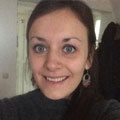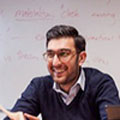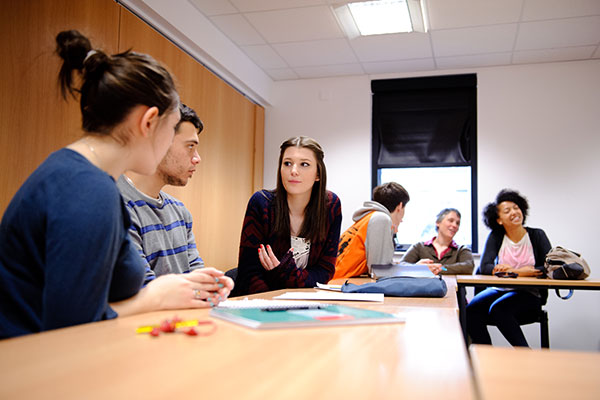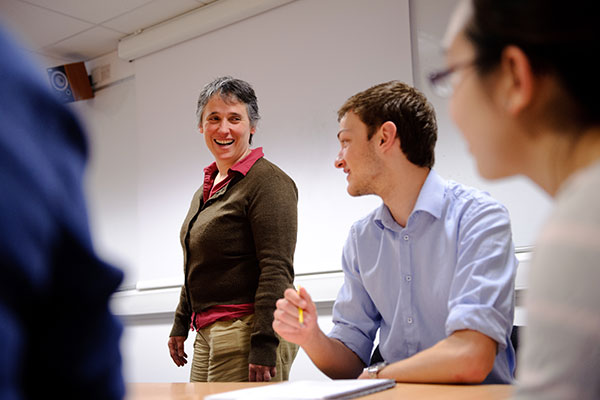View semester dates

BSc (Hons) Language, Logic and Communication
Explore the ideas and science behind the linguistic and reasoning abilities that make us human
Year of entry: 2026/27
View semester dates
Uncover and dissect the components that make human communication so special.
Through analysing human interactions, you’ll attain a rigorous scientific understanding of how language and communication work, enhancing your ability to communicate effectively. At the same time, you’ll improve your ability to understand and explain complex arguments by using specialist techniques to systematically deconstruct ideas with mathematical precision.
Using the latest tools and technology, you’ll examine language in meticulous detail—revealing a new level of understanding that has the potential to change the way you see the world.
By learning to think methodically and construct coherent arguments, you're going to improve your ability to express yourself confidently and clearly in professional, academic and social situations.
Exposure to a diverse range of topics and ideas will nurture personal and technical skills that open up a world of opportunities for you. You could go on to use your linguistic knowledge to help people as a speech therapist, apply your data analysis skills to guide the government in a public sector job or utilise your creative problem-solving abilities to lead a team in any industry. Broad experience and practice tackling complex ideas will also be an ideal platform if you decide to go on to postgraduate study.

The lecturers are genuinely passionate about what they teach, which makes the modules engaging and enjoyable. With such a wide choice of topics and great careers support, it feels like there’s a path for everyone studying Linguistics at York.
Course content
Our expert researchers in philosophy and linguistics will guide you through carefully-selected modules that introduce you to a unique but complementary set of tools, enabling you to develop a comprehensive understanding of the science behind language and communication.
Through a mix of theory, experimentation and data science, you'll enhance your understanding of language and uncover logical structures and distinctions that feed into your philosophical evaluations.
You'll study a mix of modules specific to philosophy and linguistics and others which traverse the area where the fields converge.
Through a mix of seminars, lectures and practicals, you'll learn intellectual and digital skills that you can use for the rest of your life in any academic or professional career path you choose.
Year 1
You'll be introduced to some of the core concepts of philosophy and linguistics.
Core modules
- Understanding Language in the Real World
- Language and the Mind
- Philosophical Analysis
- One of: Morphology and Syntax or Phonetics and Phonology or English Past and Present
- Logic
- Either: Ethics or Free Will
Academic integrity module
In addition to the above you will also need to complete our online Academic Integrity module.
Year 2
You'll learn more about the connection between philosophy and language and see how data science tools can help us understand language in more ways.
Core modules
- Foundations of Meaning
- Linguistics as Data Science
- Logic and Paradox
- One of: Aspects of Theory Syntax or Acoustic Phonetics and Phonological Analysis or Intermediate Language Variation and Change
- Philosophy of Language
Option modules
You will study one option module. You can study a philosophy module, or an elective module with another department. Examples can be found below. Some option module combinations may not be possible. The options available to you will be confirmed after you begin your course.
- Applied Ethics
- Aristotle
- Ethical Theory
- Lived Experiences: An Introduction to Phenomenology
- Metaphysics
- Nietzsche and Existentialism
- Philosophy of Mind
- Philosophy of Science
Elective modules
You may be able to replace one option module with an elective module, studying a complementary subject, a language or an interdisciplinary topic.
Year 3
You'll explore the interaction between computers and the mind, choose from a range of option modules and get to work independently on a chosen project.
Core modules
Project work
For your independent project, you'll complete one of the following on a topic of your choice:
- Dissertation
- Independent Study
- Project Module
- Bridge Dissertation
Option modules
You will study four option modules. You will study at least two modules from philosophy and at least one from linguistics. Examples can be found below. Some option module combinations may not be possible. The options available to you will be confirmed after you begin your course.
Philosophy
- Consciousness
- Experimental Philosophy: The Psychology of Philosophy
- Mind and Morality
- World and Mind
Linguistics
- Advanced Topics in Language Variation and Change
- Neurolinguistics: Language & the Brain
- Psycholinguistics: Language Processing
- Universals and Variation in Syntactic Systems
Elective modules
You may be able to replace one option module with an elective module, studying a complementary subject, a language or an interdisciplinary topic.
Our modules may change to reflect the latest academic thinking and expertise of our staff, and in line with Department/School academic planning.
Learning outcomes
Every course at York has been designed to provide clear and ambitious learning outcomes. These learning outcomes give you an understanding of what you will be able to do at the end of the course. We develop each course by designing modules that grow your abilities towards the learning outcomes and help you to explain what you can offer to employers. Find out more about our approach to teaching and learning.
Learning outcomes for this course
- Explain key problems and puzzles about language, logic, and communication, and apply their understanding in approaching new problems.
- Explore and develop potential solutions to complex problems and puzzles about language, logic, and communication, using a range of philosophical, formal, and quantitative research methods, including computational and data science methods underpinned by a working knowledge of statistics and computer programming.
- Critically evaluate a range of solutions to problems, and make a measured judgement about what is the best solution in each case, supporting that judgement with a sustained line of argument.
- Use scientifically grounded approaches to the nature, use and acquisition of language to investigate complex and unfamiliar linguistic phenomena, discern relevant patterns and articulate their relevance to linguistic and philosophical audiences.
- Work effectively and productively as a thinker and learner, individually and in collaboration with others.
- Communicate complex ideas in clear and accessible terms in a range of formats.
Free online courses
Get a taste of university-level study on one of York's free short courses, including our subject courses.

All lecturers and seminar tutors are very supportive if there is something bothering you. Everyone knows about the struggle that might occur when starting university and you will receive help if you need it.
Lena, 2nd Year Linguistics student

One of things I remember most fondly about York is the staff at the philosophy department. It was such an honour to have had the opportunity to discuss, debate and bounce ideas off of them. There is this culture of openness that I think really characterises the department; lecturers want their students to speak and challenge them.
Fees and funding
The fees and funding information here is for students starting in the 2026/27 academic year.
If you take a year abroad or year in industry you'll pay a reduced rate of fees for that year.
Annual tuition fees
| UK (home) | International and EU |
|---|---|
| £9,535 (TBC) | £26,900 |
The UK government has announced its intention to increase tuition fees from £9,535 to £9,790 for the 2026/27 academic year. We expect this to apply to new UK (home) undergraduate students starting their studies in September 2026.
UK (home) or international fees?
The level of fee that you will be asked to pay depends on whether you're classed as a UK (home) or international student. Check your fee status.
Fees for subsequent years
- UK (home) fees may increase within the government fee cap in subsequent academic years. We will notify you of any increase as soon as we can.
- International fees are subject to increase in subsequent years in line with the prevailing Consumer Price Index (CPI) inflation rate (up to a maximum of 10%).
More information
For more information about tuition fees, any reduced fees for study abroad and work placement years, scholarships, tuition fee loans, maintenance loans and living costs see undergraduate fees and funding.
Funding
We'll confirm more funding opportunities for students joining us in 2026/27 throughout the year.
York, Oxford, Cambridge, Imperial
Just four UK universities are rated Gold for teaching and top ten for research* in the latest national assessment exercises.
* Awarded joint 10th in the Times Higher Education ranking of the Research Excellence Framework 2021.
Teaching and assessment
You’ll study and learn with academics who are active researchers, experts in their field and have a passion for their subjects. Our approach to teaching will provide you with the knowledge, opportunities, and support you need to grow and succeed in a global workplace. Find out more about our approach to teaching and learning.
Teaching format
You’ll be empowered to actively participate in your own learning by asking questions, evaluating your thoughts and searching for answers. You’ll do this theoretically in group discussions and practically in hands-on laboratory experiments, under the supervision of a tutor who is an expert in the field. You’ll learn through a mixture of:
- small group seminars (12 - 20 students)
- reading groups
- lectures
- experiments (in our state-of-the-art labs)
- written work with written feedback
- visiting speakers.
Additionally, every staff member has a 'Feedback and Advice Time' every week that students are encouraged to use for one-to-one contact and informal discussion. In your first year, you’ll also be able to get extra support in several ways:
- from other students via our Peer Assisted Learning programme
- an additional (optional) contact hour every week
- specific help easing into university life.
In the UK, full-time students are expected to spend 1,200 hours a year learning. That's about 40 hours of classes and independent study each week during semesters. Everyone learns at a different rate, so the number of hours you spend on independent study will be different to other students on your course.
Facilities
You may use our state-of-the-art Language and Linguistic Science facilities to deconstruct and analyse language. We have three areas that you may use.
Psycholinguistics lab
Comprising two experimental booths with black-out blinds so you can measure pupil response using the world’s most precise video-based eye trackers. Two additional workstations are used for behavioural experiments. These are equipped with multiple E-prime software licences, devices for recording response times and technology for controlling auditory stimuli. The lab also has a generous multi-purpose computer laboratory with access to linguistics software for experimental design and coding.
Speech lab: Articulograph and ultrasound
Using ultrasound imaging and electromagnetic articulography, you can track the movement of the tongue and lips in real-time to analyse speech.
Recording studio
Our professional recording studio can produce clear, quiet, professional recordings suitable for academic use.
Teaching location
You will be based in the departments of Philosophy and Language and Linguistics which are based on Campus West.
Teaching on this course takes place at various locations across Campus West including Vanbrugh, Derwent and the Spring Lane Building.
About our campus
Our beautiful green campus offers a student-friendly setting in which to live and study, within easy reach of the action in the city centre. It's easy to get around - everything is within walking or pedalling distance, or you can use the fast and frequent bus service. Take a campus tour.
Assessment and feedback
Depending on your course and the modules you choose, you'll be assessed differently.
Essays, exams and coursework will make up most of your assignments, but there will also be some group work.
You'll submit summative work, which counts towards your final degree score, and formative work, which doesn't count towards your final grade but gives you the chance to practice techniques and identify areas to improve. We'll provide detailed feedback on the work you submit, supporting you in developing your academic skills.
We can make appropriate adjustments to assessment procedures for students with disabilities. See the University's disability support pages for further details.
Careers and skills
Effective communication, critical thinking and project management skills are central to most careers. Studying Language, Logic and Communication will equip you with these skills and more, which translate readily into any work context.
Our graduates have an excellent record of pursuing fulfilling paths after graduation. Some of our graduates go on to further academic study or professional training in areas including law and journalism. After additional postgraduate training, graduates with a passion for linguistics have the option to enter careers in clinical linguistics (speech and language therapy), teaching, academic research and higher/further education, and forensic linguistics (forensic speech science).
You'll also gain confidence and skills from completing a demanding course and participating fully in university life.
Career opportunities
- IT and software development
- Data analysis
- Forensic linguistics
- Speech and language therapy
- Publishing
- Broadcasting and journalism
- Marketing and communications
- Local government and public service
- Business, finance and accountancy
- Teaching
Transferable skills
- Effective communication skills
- Intercultural awareness
- Project management
- Independent learning
- Data analysis
- Teamwork
- Analytical and critical thinking
- Constructing and defending a coherent argument
- Grasping complex ideas
- Creative problem-solving
- Understanding of language and expression
Entry requirements
| Qualification | Typical offer |
|---|---|
| A levels | AAB |
| Access to Higher Education Diploma | 36 credits at Distinction and 9 credits at Merit or higher |
| BTEC National Extended Diploma | DDD |
| European Baccalaureate | 80% overall |
| International Baccalaureate | 35 points |
| T levels | Distinction overall including grade A in the Core T Level subjects in Accounting; Design and Development for Engineering and Manufacturing; Design, Surveying and Planning for Construction; Digital Business Services; Digital Production, Design and Development; Digital Support and Services; Engineering, Manufacturing, Processing and Control; Finance; Health; Healthcare Science; Legal Services; Maintenance, Installation and Repair for Engineering and Manufacturing; Management and Administration; Marketing; Science |
| Scottish Highers / Advanced Highers | Scottish Highers - AABBB Advanced Highers - not required for entry We may also be able to consider three Advanced Highers or a combination of Highers and Advanced Highers, where an applicant does not meet the grade requirement through Highers alone. Please contact us to discuss your qualifications. |
| Other international qualifications | Equivalent qualifications from your country |
Alternative offers
Meeting the following additional criteria may qualify you for an alternative offer.
| Criteria | Adjustment |
|---|---|
| Widening participation | BBC This is conditional upon successful completion of the WP programme including the YorJourney module (Black Access Programme, Next Step York) or successful completion of Realising Opportunities More about widening participation. |
| Contextual offer | BBB |
| EPQ | If you achieve C or higher in the EPQ, you may be eligible for an alternative offer up to one A level grade (or equivalent) below our typical offer. |
| Core Maths | If you achieve B or higher in Core Maths, you may be eligible for an alternative offer up to one A level grade (or equivalent) below our typical offer. |
| MOOCs | If you successfully complete our online course Logic: the language of truth, you may be eligible for an alternative offer up to one A level grade (or equivalent) below our typical offer. Details about how to evidence completion of the MOOC will be sent in your offer letter. Please note: you do not need to pay for the certificate. More about MOOCs. |
English language
If English isn't your first language you may need to provide evidence of your English language ability. We accept the following qualifications:
| Qualification | Minimum requirement |
|---|---|
| IELTS (Academic) | 6.5, with a minimum of 6.0 in each component |
| IB English | A score of 4 in English A or 5 in English B (Higher Level or Standard Level) |
| Cambridge CEFR | 176, with a minimum of 169 in each component |
| Oxford ELLT | 7, with a minimum of 6 in each component |
| Oxford Test of English Advanced | 136, with a minimum of 126 in each component |
| Duolingo | Integrated subscores: 120 overall, with a minimum of 105 in each component |
| GCSE/IGCSE/O level English Language (as a first or second language) | Grade C / Grade 4 |
| LanguageCert SELT | B2 with a minimum score of 33/50 in each component |
| LanguageCert Academic | B2 with a minimum score of 33/50 in each component |
| Kaplan Test of English Language | 478 Main Flight score with 444 in each component |
| Skills for English | B2: Merit overall, with Pass with Merit in each component |
| PTE Academic | 61, with a minimum of 55 in each component |
| TOEFL | 87 overall, with a minimum of 21 in each component (taken before January 2026) 4.5 with 5 in Listening and 4.5 in each other component (taken after January 2026) |
| Trinity ISE III | Merit in all components |
| Other English language qualifications | We also accept other English Language qualifications, including various school-leaving certificates. |
For more information see our undergraduate English language requirements.
If you haven't met our English language requirements
You may be eligible for one of our pre-sessional English language courses. These courses will provide you with the level of English needed to meet the conditions of your offer.
The length of course you need to take depends on your current English language test scores and how much you need to improve to reach our English language requirements.
After you've accepted your offer to study at York, we'll confirm which pre-sessional course you should apply to via You@York.
Next steps
Contact us
Get in touch if you have any questions
Professor Tamar Keren-Portnoy, Dr Ellie Rye, James Chantry, María Muradás-Taylor
Discover York








